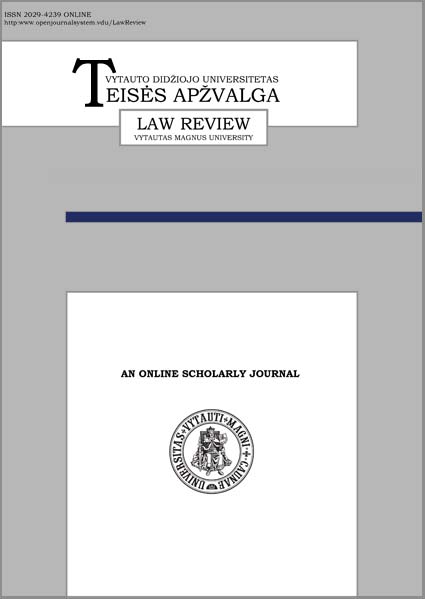Teismo pagalba arbitražui, skiriant arbitrą
Court Assistance to Arbitration in Arbitrator’s Appointment
Author(s): Tadas VarapnickasSubject(s): Law, Constitution, Jurisprudence
Published by: Vytauto Didžiojo Universitetas
Keywords: Arbitration; Arbitrator; Arbitrator’s appointment; Court assistance to arbitration; Alternative dispute resolution;
Summary/Abstract: Arbitrator’s appointment is usually one of the most crucial aspects of arbitration, maybe even the most important after arbitration agreement itself. However, there are cases when arbitrator cannot be appointed in accordance with the agreed appointment mechanism. Therefore, both international and national laws foresee rules regulating the issue of arbitrator’s appointment. One of the possible scenarios to appoint arbitrator is to apply to a national court with a request of appointment. This scenario is also foreseen in Lithuanian law on Commercial Arbitration.The subject-matter of this article is to analyse the issues related to the role of the courts in arbitration proceedings when the court is requested to appoint the arbitrator. When UNCITRAL adopted its new Model Law on International Commercial Arbitration in 2006, Lithuania amended its Law on Commercial Arbitration in 2012. This new law provides for modern approach towards court assistance to arbitration and allows national court to help arbitration proceedings by appointing arbitrator. Nevertheless, after four years of the application of this new law, there is almost no case-law on the issue. However, the popularity of arbitration is growing in Lithuania. Therefore, it is necessary to analyse in what situations and on what grounds the court may assist arbitration proceedings. Analysis of the subject-matter of this article will be useful for both arbitration scholars and practitioners.In particular, the author examines cases when parties to arbitration proceedings have the right to apply to the court to appoint an arbitrator. The author also analyses which courts are competent in solving this category of disputes as well as whether the appointment of arbitrator in the court has any influence on the recognition or recourse proceedings. In order to reveal the subject-matter of this article author examines various situations which arise or may arise in the practice. The doctrine of foreign countries as well as case-law is the main source of this article. Legal regulation of Lithuania is compared to the regulation of foreign countries. After examining the abovementioned questions, author concludes that the provisions on arbitrator’s appointment of the Law on Commercial Arbitration should be interpreted broadly. In author’s opinion, court assistance to arbitration in arbitrator’s appointment should be possible not only in ad hoc arbitration but also when institutional arbitration is chosen because different interpretation of the law could make arbitration proceedings impossible. The author also concludes, that before appointing the arbitrator, the court should suggest, for the last time, the party to arbitration to appoint the arbitrator. Only if the passive party refuses to fulfill its duty, the court should appoint independent, neutral and qualified arbitrator.
Journal: Teisės apžvalga
- Issue Year: 2017
- Issue No: 1(15)
- Page Range: 84-109
- Page Count: 26
- Language: Lithuanian

